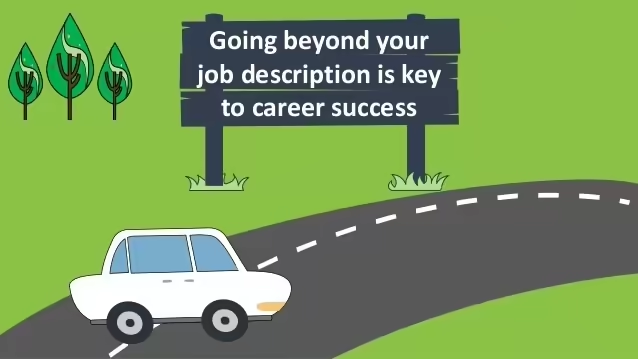What makes a worker truly indispensable? What distinguishes an average employee from a high-performing employee? It's a question we've all probably pondered at some point in our professional lives. While each firm, field, and function necessitates a distinct combination of certifications and technical skills, certain characteristics are required regardless of where you work or what you perform. Here are the defining characteristics of top-performing employees.
Curiosity: Going beyond Job Description
Top performers are likely to be well-versed in their job descriptions, but they frequently go above and beyond expectations. Employees in this category are comfortable taking the initiative and are usually proactive.

These people aren't just there to accomplish a job; they want to leave an impression on the firm as a whole. They're inquisitive, which means they're interested in more than simply the roles and responsibilities specified in a 100-word job description. Instead, they see their daily job as a means of advancing the organization's overall mission. They have an innate ability to connect the dots, recognizing that each activity, no matter how tiny, contributes to a larger goal.
These workers are always on the job. Put another way, they bring their whole self to work and genuinely believe in the impact and ripple effect of a well-done task. Their desire to learn and solve problems is wonderful but also insatiable. It's practically a reflex for them to seek out innovative solutions to company difficulties. They're asking themselves the tough questions, allowing them to stay proactive before a boss has to intervene, decreasing feedback loops, and increasing overall productivity.
When faced with new tasks and activities, high performers ask themselves what they would gain from the experience. A top software developer, for example, would be ecstatic about the prospect of working on new technology. What if they don't obtain the education they require to advance? They soon start looking for new possibilities.
Being a jack of all trades will not get you to the top of your game. While the best accept new tasks to advance, there are limits to this. It's crucial to learn how to say no in the workplace. High performers recognize that it is up to them to manage their job duties successfully. As a result, they establish limits and know how to decline politely.
These people are more than prepared to try new things and push themselves to new levels of effort and performance, even if they seem unattainable. This type of employee is not averse to doing extra work or working long hours.
Keen to learn

Though it may appear simple, the ability to swiftly and successfully learn new things is an important skill. The ability to quickly absorb information, process it and then transfer that new understanding into action promotes scaled growth.
I don't place a lot of weight on a potential employee's undergraduate degree. While some professions demand technical expertise, it's mostly about how an individual handles ambiguity. Are they capable of thriving under adversity? Are they capable of adapting in real time when confronted with a new task? If the last year and a half have taught us anything, it's that the businesses (and people) who can adapt to changing conditions through learning are the ones who avoid crises and ultimately win.
Most top achievers, according to Robert Greene's book Mastery, work with mentors to improve their talents. Before becoming famous, British scientist Michael Faraday worked as a lab assistant to eminent chemist Humphry Davy. Elisha became a powerful prophet under Elijah's guidance, according to the Bible. Greene observes the same pattern in artists, entrepreneurs, and a variety of other masters. One of the most effective strategies to improve is to learn from other high achievers.
Ignoring changes in the area or continuing to do things the same way — even if there is a better method — is one way to ensure that you stay in the same job forever or receive the title of "poor performance." High-achievers are continually looking for new methods to improve their work and keep up with industry advances. Many high achievers take steps to increase their knowledge, such as taking classes or enrolling in adult education courses in computer programming or communication. They subsequently put their newfound expertise to work, assisting their company's growth and improvement.
Turning feedback into Action

Any effective personal or professional relationship is built on the foundation of feedback. And, while delivering feedback might be painful at times, having difficult talks is necessary for business. Because perfection does not exist, even among the best personnel, feedback is required and welcomed. The way top performers respond to feedback is what truly distinguishes them.
Is it possible for them to see constructive criticism for what it is? It can be difficult to reconcile feedback at times. A standout employee, on the other hand, uses feedback to demonstrate tangible change and growth. They are acutely aware of their flaws and strive tirelessly to turn those flaws into strengths. Setbacks encourage these individuals, making them stronger and more resilient in the long run.
The goal of constructive criticism is to help individuals improve. Top workplace achievers can take constructive criticism and feedback in stride. They concentrate their efforts on recalling the advantages of receiving feedback. They consider who is providing the advice or thoughts, and they try to learn from them.
They tend not to take criticism personally when they receive it. Instead, they ask intriguing questions to ensure that they fully get how to improve. They also take proactive measures and develop strategies to implement the recommended improvements. Finally, a high achiever understands that the time it takes a superior to provide constructive criticism is an investment in their success. As a result, they consistently express their thanks for the input.
According to the Harvard Business Review, half of the high performers expect to meet with their boss at least once a month to discuss their performance reports. It is easier to improve when you receive feedback. Top performers would be forced to speculate about their results if they didn't get feedback – and that's no way to rise to the top.
Growth-oriented

Continuing education, skills-based training, research, and extra duties are all options for professional development. These are the kinds of possibilities that high-performing personnel is continuously looking for. They understand that attending workshops or seminars can help them gain the skills, qualifications, and confidence they need to improve their performance at work.
A high-performing employee appreciates the possibilities for professional development provided by their employer. They take an active role in their growth and invest time in study and learning. They look for new challenges at work and strive to discover learning opportunities on their own time to increase their range of abilities and experience. Growth options include the following:
- Seek out a mentor.
- Read books about the industry.
- Sign up for a webinar or seminar.
- Make an application for a certificate program.
- Take part in a workshop.
- Request feedback from a coworker or management.
- Participate in an online community that is linked to your industry.
Care about others
Truly outstanding employees are those who improve the lives of those around them. If it's a great manager or leader, this entails grooming and developing the people who report to them. If it's a junior or entry-level employee, this entails routinely uplifting and encouraging peers with whom they collaborate.
They demonstrate high levels of emotional intelligence; employees that excel can empathize with the people they work with. They see their coworkers as an extension of their family in many respects. This is because they understand that when one employee succeeds, it benefits everyone. In the end, exceptional employees are simply human, and their humanity is an asset, not a liability.
Although going above and above is necessary, top achievers aren't necessarily antisocial. They spend time getting to know their coworkers and forming bonds with them.
As a result, they will know the experts and who to contact for assistance or feedback. When you get to know your coworkers, you're less likely to disappoint them by missing deadlines or submitting poor work. High performers value their peers and want everyone to succeed, so they go above and beyond.
If we are to go by Pareto's rule it is likely that 20% of these high-performing employees do 80% of the organization's most valuable work. They assume the mantle of leadership, and they propel the organization forward. It is incumbent upon the leadership and management to ensure systems that recruit and successfully retain high-performing individuals.

